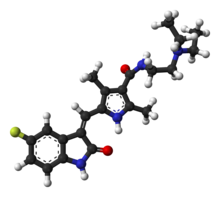Sunitinib
 |
|
 |
|
| Clinical data | |
|---|---|
| Trade names | Sutent |
| AHFS/Drugs.com | Monograph |
| MedlinePlus | a607052 |
| License data | |
| Pregnancy category |
|
| Routes of administration |
Oral |
| ATC code | L01XE04 (WHO) |
| Legal status | |
| Legal status |
|
| Pharmacokinetic data | |
| Bioavailability | Unaffected by food |
| Protein binding | 95% |
| Metabolism | Hepatic (CYP3A4-mediated) |
| Biological half-life | 40 to 60 hours (sunitinib) 80 to 110 hours (metabolite) |
| Excretion | Fecal (61%) and renal (16%) |
| Identifiers | |
|
|
| CAS Number |
341031-54-7 |
| PubChem (CID) | 5329102 |
| IUPHAR/BPS | 5713 |
| DrugBank |
DB01268 |
| ChemSpider |
4486264 |
| UNII |
V99T50803M |
| KEGG |
D06402 |
| ChEBI |
CHEBI:38940 |
| ChEMBL |
CHEMBL535 |
| Chemical and physical data | |
| Formula | C22H27FN4O2 |
| Molar mass | 398.474 g/mol 532.561 g/mol (malate) |
| 3D model (Jmol) | Interactive image |
|
|
|
|
|
|
|
Sunitinib (marketed as Sutent by Pfizer, and previously known as SU11248) is an oral, small-molecule, multi-targeted receptor tyrosine kinase (RTK) inhibitor that was approved by the FDA for the treatment of renal cell carcinoma (RCC) and imatinib-resistant gastrointestinal stromal tumor (GIST) on January 26, 2006. Sunitinib was the first cancer drug simultaneously approved for two different indications.
Sunitinib inhibits cellular signaling by targeting multiple receptor tyrosine kinases (RTKs).
These include all receptors for platelet-derived growth factor (PDGF-Rs) and vascular endothelial growth factor receptors (VEGFRs), which play a role in both tumor angiogenesis and tumor cell proliferation. The simultaneous inhibition of these targets therefore reduces tumor vascularization and triggers cancer cell apoptosis and thus results in tumor shrinkage.
Sunitinib also inhibits CD117 (c-KIT), the receptor tyrosine kinase that (when improperly activated by mutation) drives the majority of gastrointestinal stromal cell tumors. It has been recommended as a second-line therapy for patients whose tumors develop mutations in c-KIT that make them resistant to imatinib, or who the cannot tolerate the drug.
In addition, sunitinib binds other receptors. These include:
The fact that sunitinib targets many different receptors, leads to many of its side effects such as the classic hand-foot syndrome, stomatitis, and other dermatologic toxicities.
...
Wikipedia
